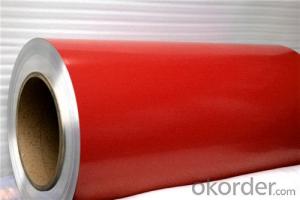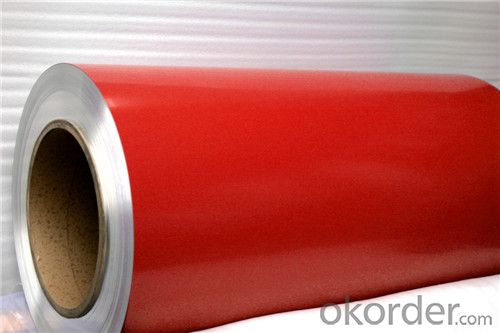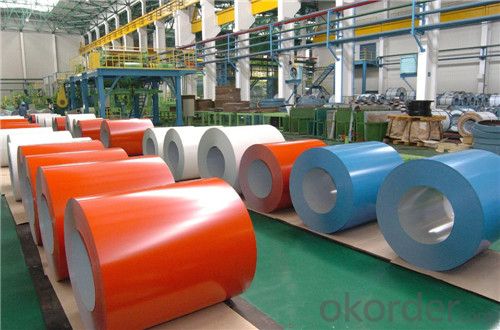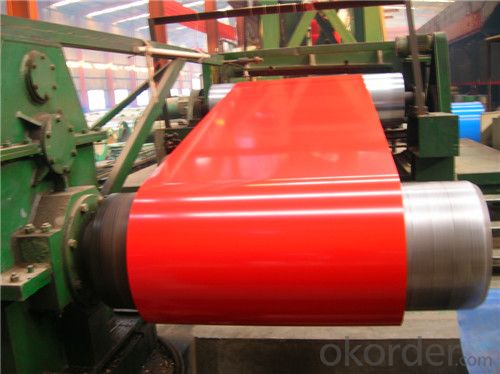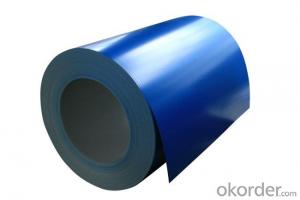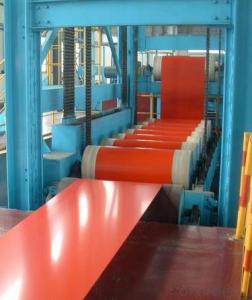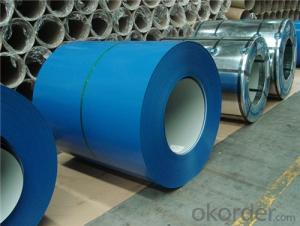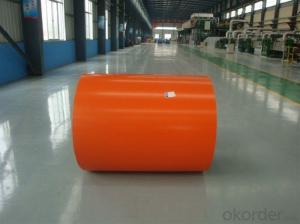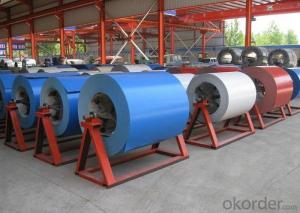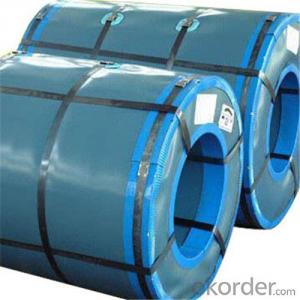Prepainted rolled Steel Coil for Construction Roofing
- Loading Port:
- Shanghai
- Payment Terms:
- TT or LC
- Min Order Qty:
- 25 m.t.
- Supply Capability:
- 30000 m.t./month
OKorder Service Pledge
OKorder Financial Service
You Might Also Like
Structure of Prepainted Rolled steel Coil for Construction Roofing
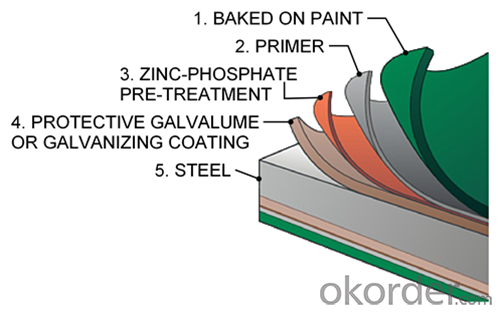
Description of Prepainted Rolled steel Coil for Construction Roofing
Prepainted Rolled steel Coil is a kind of coated steel coil/sheet. With the cold rolled steel of different strength and thickness as substrate, it is produced through applying Al-Zn coat on both faces by hot dip process. In its coating, Al accounts for about 55%, Si 1.6%, while the remaining is Zn. Aluminum zinc coils enjoys both the physical protective feature and durability of Al and the electrochemical protective property of Zn. And its surface has bright silver color and regular embossed-like figure, which are highly decorative.
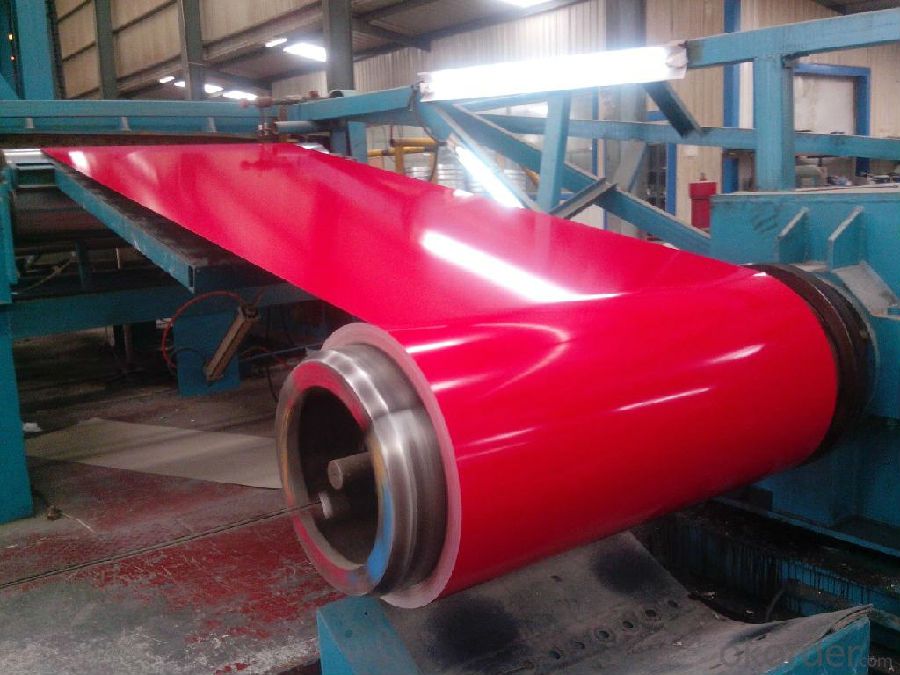
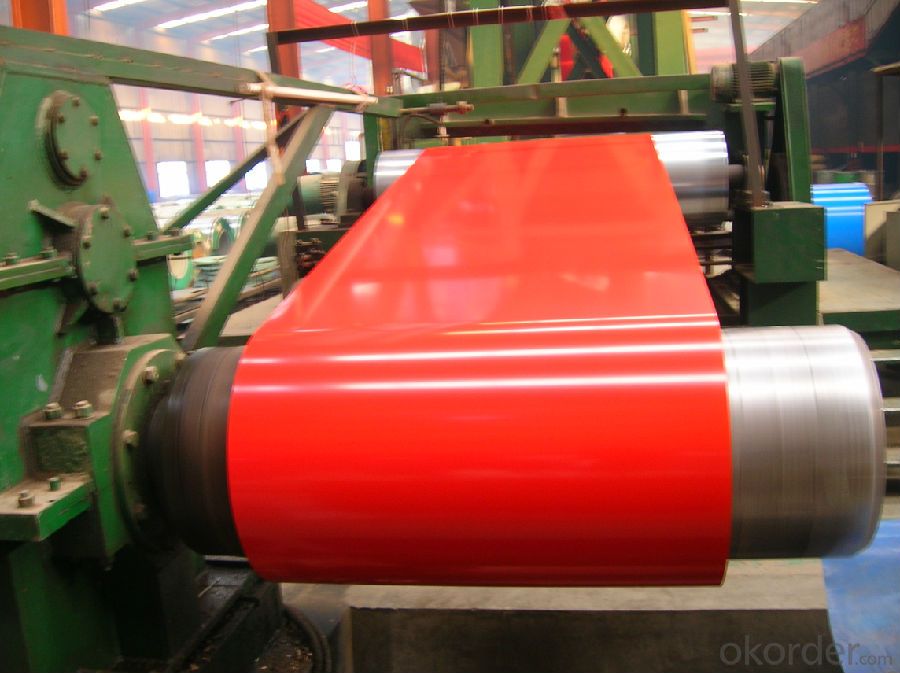
Main Feature of Prepainted Rolled steel Coil for Construction Roofing
1.Corrosion resistance: It mainly depends on the aluminum protection. When the zinc being worn, the aluminum will form a dense layer of aluminum oxide, resist corrosion material to prevent further corrosion inside.
2. Heat resistance: Aluminum zinc alloy steel sheet has excellent heat resistance, can withstand high temperatures over 300 centigrade, and is similar with aluminized steel high temperature oxidation resistance. It often used in chimney pipes, ovens, fluorescent lighting device and the device cover.
3. Heat reflective: Galvanized steel plate heat-reflective high rate is twice as galvanized steel, often used to make insulation materials.
4. Economy: Because density of 55% AL-Zn is smaller than the density of Zn, so in the same weight and thickness of Galvanized zinc layer, aluminum-zinc steel plate is larger area more than 3% of galvanized steel sheet.
Applications of Prepainted Rolled steel Coil for Construction Roofing
1. Construction and building: roofing; ventilating duct; handrail; partition panel;etc.
2. Electric appliance: refrigerator; washing machine; refrigerator; DVD;etc.
3.Transportation: oil tank; road sign; etc.
4.Agriculture:barn; etc.
5.Others:vending machine; game machine; etc.
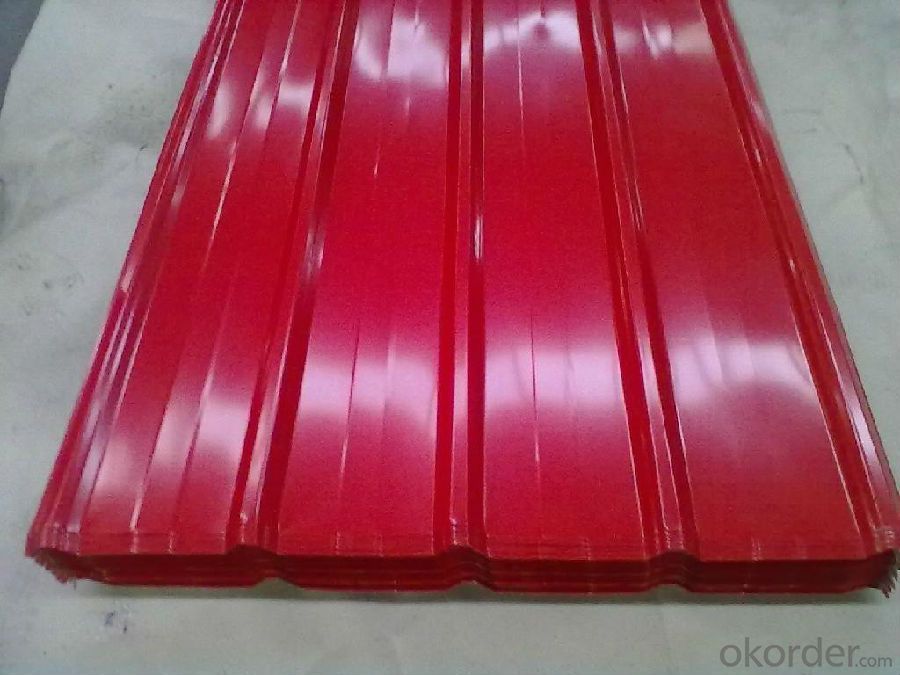
Specifications of Rolled steel Coil for Construction Roofing
Product | Prepainted Rolled steel Coil for Construction Roofing |
Material Grade | SGCC / SGCH / DX51D+AZ, etc |
Thickness | 0.2-3.0mm |
Width | 600-1500mm |
Tolerance | Thickness: +/-0.02mm , Width:+/-2mm |
Zinc-coating | AZ40-150g/m2 |
Technique | Raw material: Hot rolled steel coil --> Cold rolled_>hot dipped galvalume |
Surface | Dried, Chromated, Unoiled |
Spangle | Regular spangle , small spangle, zero spangle |
ID | 508MM |
Coil weight | 10MT max |
Export package | Cardboard inner sleeves, Waterproof paper, galvanized steel covered and steel strip packed |
FAQ of Prepainted Rolled steel Coil for Construction Roofing
We have organized several common questions for our clients,may help you sincerely:
1. What is the minimum order quantity ?
Our MOQ is 50mt for each size. And we will consider to give more discount if you make big order like 1000 tons and more. Further more, the more appropriate payment term your offer the better price we can provide.
2. How long can we receive the product after purchase?
Usually within thirty working days after receiving buyer’s advance payment or LC. We will arrange the factory manufacturing as soon as possible. The cargo readiness usually takes 15-25 days, but the shipment will depend on the vessel situation.
3. How to guarantee the quality of the products?
We have established the international advanced quality management system,every link from raw material to final product we have strict quality test;We resolutely put an end to unqualified products flowing into the market. At the same time, we will provide necessary follow-up service assurance.
- Q: What are the different types of steel coil coatings for corrosion resistance?
- There are several different types of steel coil coatings that are specifically designed to provide corrosion resistance. These coatings can be categorized into two main types: organic coatings and metallic coatings. 1. Organic Coatings: - Polyester: Polyester coatings are commonly used for steel coil applications due to their excellent corrosion resistance and durability. They offer good weatherability and resistance to chemicals, making them suitable for outdoor applications. - Polyvinylidene Fluoride (PVDF): PVDF coatings are highly resistant to UV radiation, weathering, and chemicals. They provide exceptional durability and are often used in demanding environments such as coastal areas or industrial settings. - Polyurethane: Polyurethane coatings offer excellent abrasion resistance and provide a high level of corrosion protection. They are commonly used in applications where there is a higher risk of mechanical damage or exposure to harsh conditions. - Epoxy: Epoxy coatings provide excellent adhesion and chemical resistance. They are often used in industrial applications where resistance to chemicals, solvents, and oils is required. 2. Metallic Coatings: - Galvanized Coatings: Galvanized coatings involve applying a layer of zinc to the steel surface through a hot-dip or electroplating process. This creates a barrier between the steel and the surrounding environment, providing effective corrosion protection. Galvanized coatings are widely used in various industries due to their cost-effectiveness and good durability. - Galvannealed Coatings: Galvannealed coatings are similar to galvanized coatings but undergo an additional heat treatment process. This results in a coating with increased hardness and improved paint adhesion, making it suitable for applications that require additional surface protection or paintability. It is important to consider the specific requirements of the application and the level of corrosion resistance needed when selecting the appropriate steel coil coating. Consulting with coating manufacturers or industry experts can help determine the most suitable coating for a particular application.
- Q: What are the different coil packaging methods used for steel coils?
- Steel coils can be packaged using various methods to guarantee their protection and secure transportation. These methods also help optimize storage space. Some of the commonly used packaging methods for steel coils are as follows: 1. Strapping: Metal or plastic straps are used to secure the steel coils. This ensures stability and prevents unrolling or shifting during transportation. Strapping is suitable for smaller coils or when other packaging methods are also utilized. 2. Stretch wrapping: Steel coils are tightly wrapped using a stretch film. This technique provides excellent protection against dust, moisture, and other contaminants. It also keeps the coils tightly bound and prevents movement during handling and transportation. 3. Steel banding: Steel bands or straps are employed to secure the coils. This packaging method offers superior strength and durability. It is ideal for larger and heavier steel coils that require additional reinforcement. 4. Wooden crating: Particularly large or heavy steel coils are packaged in wooden crates. These crates provide enhanced protection against impacts, moisture, and other external factors. Wooden crating is commonly used for long-distance transportation or when coils need to be stored for extended periods. 5. Coil saddles: Specialized devices called coil saddles are used to package large coils securely. These devices prevent rolling or movement. Coil saddles are preferred when strapping or wrapping is not feasible. 6. Paper interleaving: Sheets of paper are placed between each layer of steel coils to prevent damage caused by friction. This method is commonly used for coils with a high surface finish or those susceptible to scratching. Each of these packaging methods offers distinct advantages and is chosen based on factors such as coil size, weight, transportation requirements, and desired level of protection. By employing these methods, steel coil manufacturers and distributors can ensure the safe arrival of their products in optimal condition.
- Q: Can steel coils be galvanized?
- Yes, steel coils can be galvanized. Galvanization is a process of applying a protective zinc coating to steel to prevent corrosion. Steel coils are often galvanized to increase their durability and resistance to rust.
- Q: My 8-year-old and 9-year-old boys have approached me with an interesting question. Does fire burn steel? One says yes, the other says no. Help me to settle yet another debate :)
- Easy. okorder /
- Q: How are steel coils used in the manufacturing of electrical equipment?
- Steel coils are used in the manufacturing of electrical equipment as they provide structural support and help in the efficient transfer of electrical energy. They are commonly used in transformers, motors, and generators to create magnetic fields that enable the conversion and transmission of electrical power.
- Q: is red steel any good??????? not sure im really impressed but im not really into fighting games but it looks cool.... so whats your views guys???????anyone bored of smooth moves yet?anyone think the new sonic is bit cra ppy !!!!!!!!!!! darn them any new goooood games coming oput on the wii??
- red okorder . I think it deservs a rental
- Q: I bought a stainless steel mood ring two days ago, but would it rust?Thanks in advance!
- This Site Might Help You. RE: Do stainless steel mood rings rust? I bought a stainless steel mood ring two days ago, but would it rust? Thanks in advance!
- Q: How are steel coils used in the production of HVAC equipment?
- Steel coils are commonly used in the production of HVAC equipment as they serve as the primary component in heat exchangers. These coils are responsible for transferring heat between the refrigerant and the air, allowing the equipment to cool or heat the surrounding space effectively. The steel coils are designed to maximize surface area and optimize heat transfer, ensuring efficient and reliable operation of HVAC systems.
- Q: Where are the coils and the steel plates used? Where did the steel plate come from?
- Steel plate is divided into many kinds of PU, low alloy, boiler plate, vessel plate, high strength plate, etc..
- Q: I want a stainless steel refrigerator that doesn't leave fingerprints and I'm looking on Lowe's website but they have too many choices and i don't have a clue what they are. The have stainless, stainless look, stainless steel, monochromatic satina, and monochromatic stainless steel. Can anyone tell me what the heck those mean? lol
- Stainless Look vs Stainless in refrigerators usually refers to true Stainless Steel versus Satina. There's pluses and minuses both ways actually. With true Stainless, you have the exact match to the rest of the kitchen (because Satina is only used on refrigeration), but it is more prone to fingerprints, and is not magnetic. The Satina finish has a good look when not directly near a Stainless appliance, and does not show fingerprints and will accept magnets, but is not an exact match to stainless. My usual recommendation is that if you have a kitchen full of Stainless products, stick with the true Stainless Steel. If the refrigerator is more isolated, or is the only thing you want to have a Stainless look, you may want to consider Satina. If you put a lot of magnets on the refrigerator, I'd also recommend to go Satina. And since you don't want fingerprints, the Satina steel might come to your liking.
Send your message to us
Prepainted rolled Steel Coil for Construction Roofing
- Loading Port:
- Shanghai
- Payment Terms:
- TT or LC
- Min Order Qty:
- 25 m.t.
- Supply Capability:
- 30000 m.t./month
OKorder Service Pledge
OKorder Financial Service
Similar products
Hot products
Hot Searches
Related keywords
